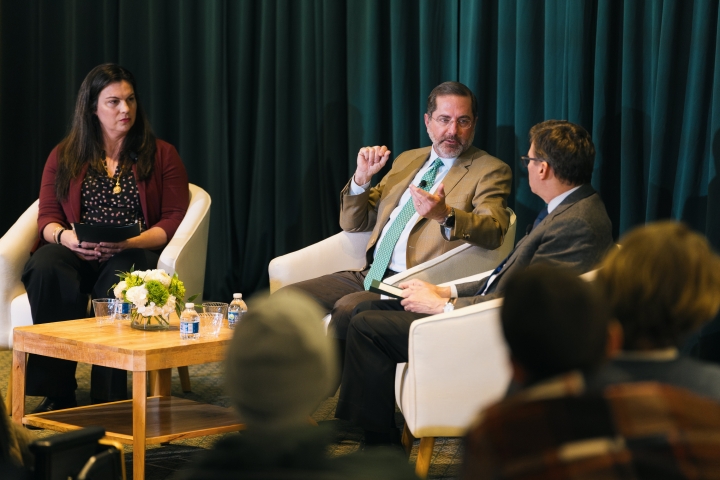Noting that the Republican and Democratic parties are in the midst of a major political realignment, former U.S. Health and Human Services Secretary Alex Azar II ’88 said in a speech at Dartmouth last week that public distrust in governmental institutions has played into how Americans view health care policy and management.
While such distrust existed before the global disruption of COVID-19, “COVID just hyperaccelerated that,” Azar said in the Feb. 6 talk organized by the Nelson A. Rockefeller Center for Public Policy and the Social Sciences.
Azar clerked for Supreme Court Justice Antonin Scalia, served as general counsel to the secretary of health and human services from 2005 to 2007, was president of Lilly USA, LLC, the largest division of the pharmaceutical Eli Lilly and Company, and was named HHS secretary by President Donald Trump in 2018, in which capacity he served from 2019 to 2021.
“You normally would think, Republicans are pro-pharma. Not so much anymore. ‘That’s Big Pharma, big is bad.’ Leaders aren’t trusted very much. And that comes into health care,” Azar said in a discussion co-sponsored by the Political Economy Project and The Dartmouth Institute for Health Policy and Clinical Practice and moderated by Carrie Colla ’01, adjunct professor in the Department of Economics, and Charles Wheelan ’88, clinical professor of Business Administration at Tuck School of Business.
Because the problems besetting U.S. health care policy and administration are so complex, Azar said, “that’s why you see so much happen at the regulatory administrative state level instead of Congress doing its job and legislating in these areas because they just can’t. They know they can’t get their act together because of all these tribal, cross-cutting cleavages on issues.”
About 85 people attended the speech in Filene Auditorium on a snowy night, and more than 500 people have watched the livestream.
As an economics and government major at Dartmouth, Azar credited his training for shaping the trajectory of his career. “Literally, my career has been built on my Dartmouth microeconomics understanding applied against public policy, and trying to bring those insights into public policy. Everything I do in health care is about how can I take a system that right now does not function according to market forces and introduce more market forces into it.”
Numerous people have asked Azar, he said, what to expect from Trump in his second term on health care.
“If I had to describe President Trump’s thinking or agenda on health care, it would be choice, competition and populism. Give patients choice, not mandates,” said Azar, who was the architect in Trump’s first term of Operation Warp Speed, which developed, manufactured and distributed the first COVID-19 vaccine.
One of the questions for the health care industry is how to handle the enormous price tag for patient care. How do government and the medical sector work together to deliver better, more efficient care?
The fee-for-service, health insurance model has its origins in the New Deal, Azar said. As it stands now, he added, “our system is built to pay for (the cholesterol-lowering drug) Lipitor, it’s built to pay for pills. It’s not built to pay for life-altering curative therapies that cost a million dollars. So we have to figure out new financing mechanisms. That’s an economic problem.”

Asked what advice he might give, if asked, to Robert F. Kennedy, Jr., Trump’s nominee for HHS secretary, Azar said he would first look to collaborate with civil servants.
“Yes, there are issues with the administrative state, and yes, there are issues with too many people and sometimes people who don’t align to whoever’s elected’s vision. But there are some quite good career people there. You can’t get things done without working through and with those folks. I found most of the career people that I worked with to be very honorable and very understanding of our constitutional system of government, ” Azar said.
The second would be to emphasize preventive, or what Azar called value-based care, such as participating in telehealth, deciding on a home visit, sending a home health aide, sending meals to a house-bound patient, or installing a ramp or air conditioning, Azar said.
The reality, he added, is that American health care doesn’t, as a rule, do these things. “And it’s so pennywise, pound-foolish. We can save 5, 10 or 15%—just from simple interventions like that.”
Finally, Azar observed, even as the American model of health care seems unsustainable, the potential for breakthrough treatments for disease has never been greater. “We’re at a genuine golden age of medicine and biopharmaceuticals,” he said.
“I have been with a 19-year-old man who had sickle cell anemia, who went into a children’s hospital and 30 days later walked out after a gene cell transplant with no sickles in his blood. So he went from a shortened life, a life of pain and agony, to a hopefully lifelong cure of a disease,” Azar said.
When scientists test drugs now, Azar said, the question is less, will this drug work as promised, but will there be “off-target safety or efficacy effects that we couldn’t have predicted in advance?”
The potential for gene therapies has “revolutionized health care. And my hope is that we will not kill this golden goose,” because government and health care industries can’t devise innovative ways to pay for such therapies, Azar said.
